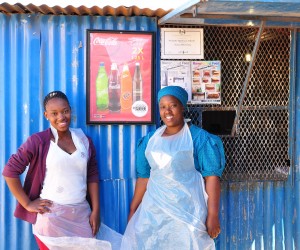More than 35 000 South African female entrepreneurs have to date benefitted from a unique partnership between the world's largest beverage company and UN Women (the United Nations’ organisation dedicated to gender equality and the empowerment of women) and Hand in Hand (an NGO with the vision of reducing poverty through job creation).
Coca-Cola South Africa aims, via its 5by20 programme, to address the skills gap facing women in the small retail industry in South Africa, thus advancing women’s economic empowerment by providing female entrepreneurs with training in business skills, leadership training, mentoring and peer networking skills.
The programme is part of Coca-Cola’s global commitment to enable the economic empowerment of five million women entrepreneurs across the company’s value chain by 2020.
According to Vukani Magubane, Director of Public Affairs and Communications, Coca-Cola South Africa, the company partnered with UN Women and Hand in Hand to identify and address barriers facing women entrepreneurs in Coca-Cola’s supply chain in 2013.
“The initiative provides women with business skills, leadership training, mentoring, peer networking skills and access to financial assets. With the support of Hand in Hand, the programme initially aimed to train a total of 25 000 women entrepreneurs, many of whom are running small retail businesses within the Coca-Cola value chain.”
The programme, which was piloted in Gauteng, is on a three year roll-out plan and by the end of this year will see the continuation of training women in Gauteng, Mpumalanga and the Eastern Cape. In addition to this, Coca-Cola South Africa and UN Women are working towards expanding the 5by20 training programme to Limpopo, KwaZulu-Natal and the Western Cape.
Magubane says they are already seeing tangible results in the areas in which the programme has been implemented.
“On average, a women’s income increases three-fold after being on the program for one year. We know that there is a skills shortage among these women in terms of how to run a small business. But if we help to address this skills gap, there a positive ripple effect on the community and future generations. Research shows that a woman’s income can immensely benefit children’s education and other family needs.
“Initial results indicate that the training has already begun to stimulate business growth, and many participants are now able to make better informed decisions about their businesses, which are positively impacting their families and communities.
“Women form the backbone of families and communities, particularly in the developing world. A growing body of evidence demonstrates that investing in women’s business success positively impacts local economies, child survival, welfare and education by providing the women in the programme with the business skills required to run a successful business. The women are able to provide for their families and communities while creating employment,” says Magubane.
A number of the programme candidates are today success stories of which Magubane is very proud. One particular woman she says stands out, is Katlehong business woman widow and mother Nonhlanhla Mabe, who now owns a successful micro-business in Katlehong called the Malang Tuck Shop. The shop sells daily consumable and household goods.
Talking to Achiever about the biggest challenges in South Africa when it comes to addressing gender equality and skills development, and how Coca-Cola South Africa’s 5by20 programme will play a role in alleviating the plight of women in the small retail industry, Magubane says the biggest issue South Africa is facing in addressing gender equality and skills development is that many female micro entrepreneurs do not have the relevant business skills training that would help sustain or elevate the businesses growth.
“Women in South Africa, one of the aspects of the 5by20 programme, is to alleviate the plight of women in the small retail industry by providing them with skills that will help them manage, market and grow their business successfully. By learning stock and finance management, customer service and the many other skills the training provides, the women become able to improve their daily business practices in order to increase their profit.”
She says the greatest need among these women when it comes to running their SMMEs, is that of acquiring proper business skills. The majority of the women who participate in the programme run spaza shops and tuck shops born from the need to provide for their families. As necessity entrepreneurs, running a business often becomes a challenge because of the hurdles they have to overcome without the necessary skills.
Her advice to the private sector and Government interested in taking on similar initiatives is to form partnerships. She believes that this way, across the private sector and civil society organisations, greater results can be achieved. Coca-Cola South Africa calls this the golden triangle approach and is dedicated to contributing to thriving communities and helping the government reach its targets.
“We believe this programme will not only contribute to Government’s goal of empowering women, but also answers to the need for entrepreneurial skills in South Africa. We believe that by building solid partnerships such as with UN Women and Hand in Hand, with aligned goals and outcomes, we are able to make a greater impact in terms of closing the skills gap and building economically empowered and sustainable communities in South Africa,” Magubane told Achiever.






























